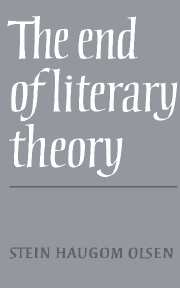Book contents
- Frontmatter
- Contents
- Preface
- Literary aesthetics and literary practice
- Interpretation and intention
- Authorial intention
- Text and meaning
- The ‘meaning’ of a literary work
- Defining a literary work
- What is poetics?
- On unilluminating criticism
- Criticism and appreciation
- Value-judgements in criticism
- Literature, fiction, and reality. A problematic relationship
- Thematic concepts: where philosophy meets literature
- Literary theory and literary aesthetics
- Notes
- Bibliography
- Index
Preface
Published online by Cambridge University Press: 05 November 2011
- Frontmatter
- Contents
- Preface
- Literary aesthetics and literary practice
- Interpretation and intention
- Authorial intention
- Text and meaning
- The ‘meaning’ of a literary work
- Defining a literary work
- What is poetics?
- On unilluminating criticism
- Criticism and appreciation
- Value-judgements in criticism
- Literature, fiction, and reality. A problematic relationship
- Thematic concepts: where philosophy meets literature
- Literary theory and literary aesthetics
- Notes
- Bibliography
- Index
Summary
The essays in this book are essays in literary aesthetics. They deal with philosophical problems which arise in connection with the appreciation and evaluation of literary works and with problems that arise because there is a practice of writing and reading literary works. Though they were written over a period of more than ten years, the essays are unified by a consistent perspective on theoretical problems and by a consistent scepticism about the possibility of any general theory of literature, be it Marxist, Freudian, Structuralist or Post-Structuralist. Literary theories come and go, it seems, more and more quickly. But the practice of literature remains and so do the philosophical problems connected with it. The need to deal with these problems in a philosophically responsible way remains and cannot be ignored.
‘Literary Theory and Literary Aesthetics’ and ‘Literature, Fiction and Reality. A Problematic Relationship’ appear for the first time in this book. The other essays have all been published before in various journals: ‘Authorial Intention’, ‘Interpretation and Intention’, and ‘On Unilluminating Criticism’ in The British Journal of Aesthetics, Vol. 13 (1973), pp. 219–31; Vol. 17 (1977), pp. 210–18; Vol. 21 (1981), pp. 50–64; ‘Defining a Literary Work’ and ‘Value-judgements in Criticism’ in The Journal of Aesthetics and Art Criticism, Vol. 35 (1976–7), pp. 133–42; Vol. 42 (1983–4), pp. 125–36; ‘What is Poetics?’ in The Philosophical Quarterly, 26 (1976), pp. 338–51; ‘Literary Aesthetics and Literary Practice’ in Mind, Vol. 90 (1981), pp. 521–41; ‘Text and Meaning’ in Inquiry, 25 (1982), pp. 263–70; ‘The “Meaning” of a Literary Work’ in New Literary History, Vol. 14 (1982–3), pp. 13–32; ‘Criticism and Appreciation’ in Peter Lamarque ed., Philosophy and Fiction.
Information
- Type
- Chapter
- Information
- The End of Literary Theory , pp. vii - viiiPublisher: Cambridge University PressPrint publication year: 1987
